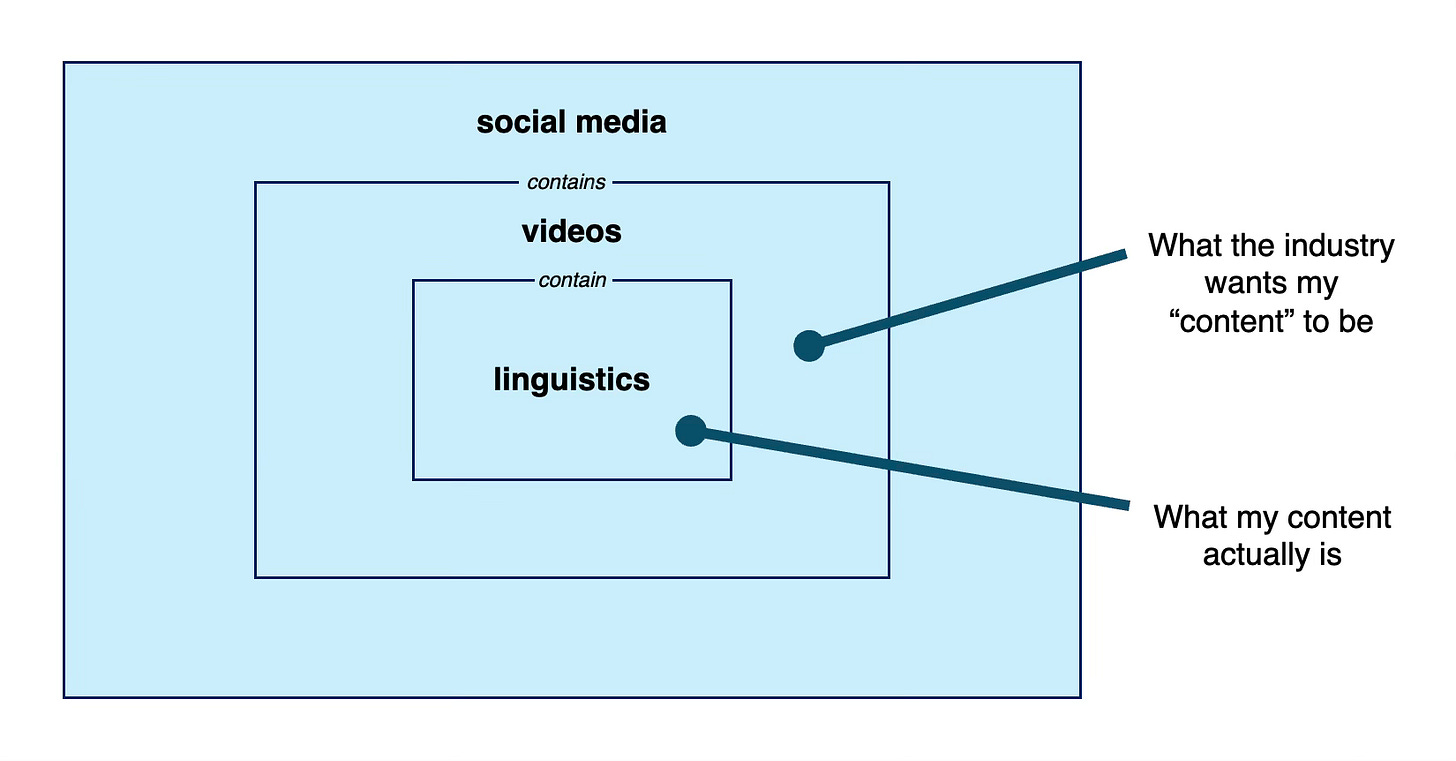the "contentification" of culture
what are we really containing?
I just finished attending a three-day “content creator summit,” and I came out of it completely disillusioned with the idea of “content.”
Every lecture and panel I attended was obsessed with the buzzword. Managers urged me to “make content everyday.” Marketers told me how to “better sell my content.” Industry insiders gave me advice for “making better content.”
In short, everybody was using the word “content” as the goal of social media, as the final product we should all be striving for.
Etymologically, this sort of makes sense. The word “content” just means “something that is contained,” the implication being that it’s held within the “medium” of “social media.” Anybody making things online is therefore there to produce content.
But this premise is flawed. To me, “content” is a means to an end, not the end itself. I make linguistics videos not because I want to make videos, but because I want to communicate about linguistics. In this sense, linguistics is the “content” and my videos are the medium, which would go against the other definition.
The difference is that managers and marketers don’t care about linguistics. It makes sense for them to extrapolate “content” to mean “videos,” because they want videos to be the product. By nature of their profession, they’re incentivized to use the word in a way they can commercialize.
Of course, some influencers are definitely in the business of “creating content” for the sake of creating content. Mr. Beast is a great example. He absolutely makes videos with profit in mind, as do his thousands of disciples.
But I would venture that most creators get into social media because they want to create, for whatever end. They don’t make “content” as the industry sees it; they make videos that have “content” in their own right. Art influencers want to make art; music influencers want to make music.
And yet, due to the platformization of creative professions, art and music have both been captured under the “content” label. Now artists make art content and musicians make music content.
Part of this is the natural constraint of the algorithm. If you’re an artist trying to go viral, you have to do things that will catch attention, meaning that you have to play into the industry idea of “content.”1
I’m not actually shitting on viral art and music. I think there’s absolutely something compelling about it, and art has always evolved around different constraints. It’s the conflation of art as “content” that merits scrutiny.
Increasingly, creatives are being subjected to the phenomenon of influencer creep: having to act like the industry’s idea of “content creators” in order to share their work online.2 This both flattens their artistic expression into mere content generation, and changes how we perceive that art.
Unless we recognize “content” as a commercialized buzzword, then, we can lose sight of its underlying message—the real content.
Prey, Robert, and Seonok Lee. “Platform Closure and Creator Creep: What We Can Learn From Korean Indie Musicians.” International Journal of Communication 18(2024), 4167-4186. https://ijoc.org/index.php/ijoc/article/viewFile/22809/4775.
Bishop, Sophie. “Influencer Creep: How Artists Strategically Navigate the Platformisation of Art Worlds.” New Media and Society, 0(0). https://doi.org/10.1177/14614448231206090.




Interestingly enough, this has been a problem (obviously in different forms) for centuries now, going back to what Marx described as “reification”(from Latin res/rei, “thing”), that he believed was one of the core characteristics of capitalism. The idea that art and culture are not valuable in and of themselves but rather their value comes exclusively from how much we are willing to pay for it (in this case, with our time), almost always leads to the kind of distortions that you describe here.
I am not a sales person but, for a number of reasons, spent a few years in sales. At one level, the purpose of sales is to solve a problem; person has <x> need, I have the solution, shake hands and a sale happens. When done properly it is an art form and a win for both sides of the transaction. Enter the mechanics; I'm given a quota and my pay for the year is based on attainment of said quota. Since I'm not good at sales, the quota soon became 'the thing'. I understand why bad sales reps have such a horrible reputation. At the point you're working for the commission, the job stops being art and turns into a grind. I've seen similar processes in engineering (work to the deadline or budget rather than solving a problem). This process just sucks the life out of any activity.